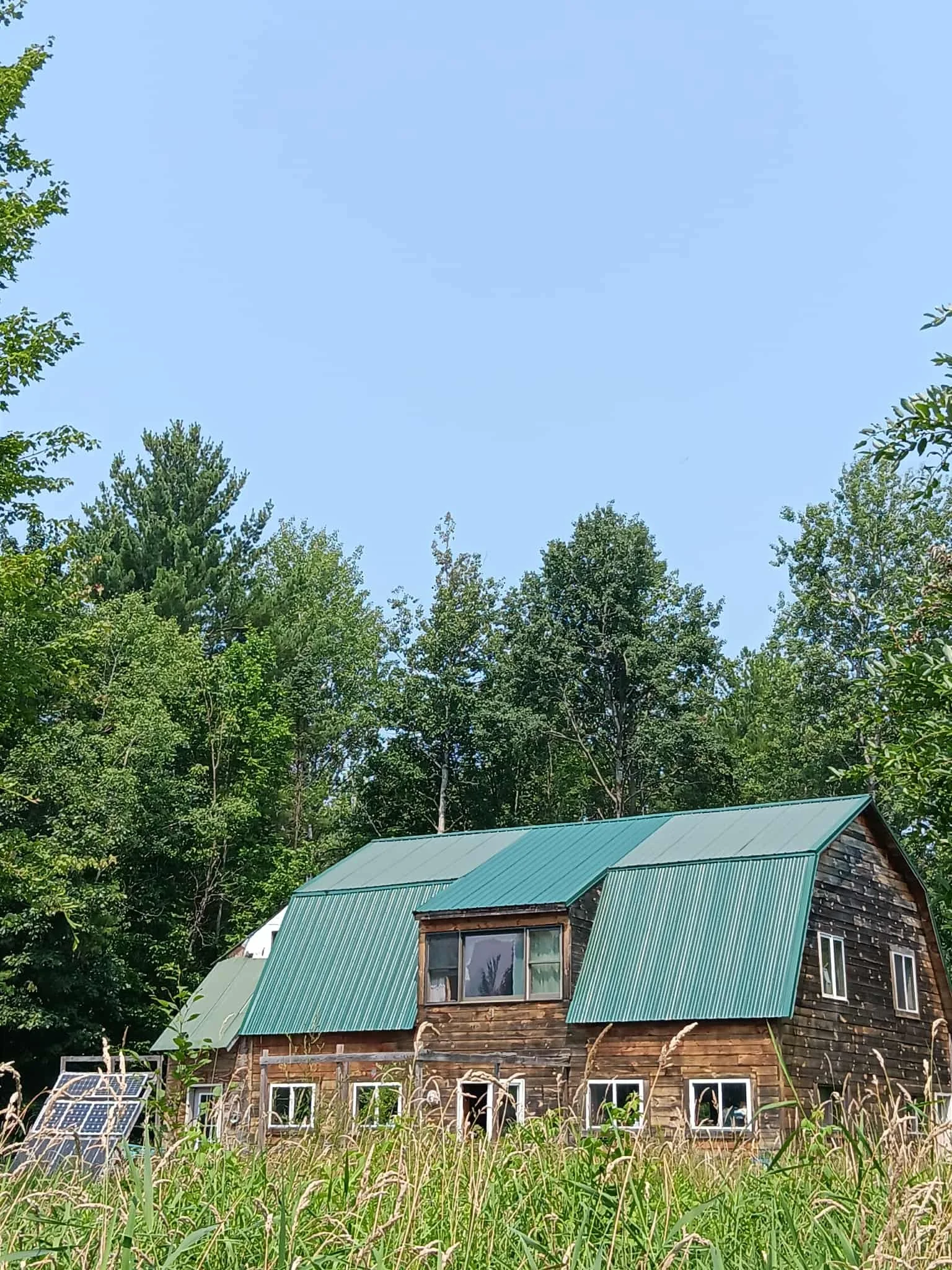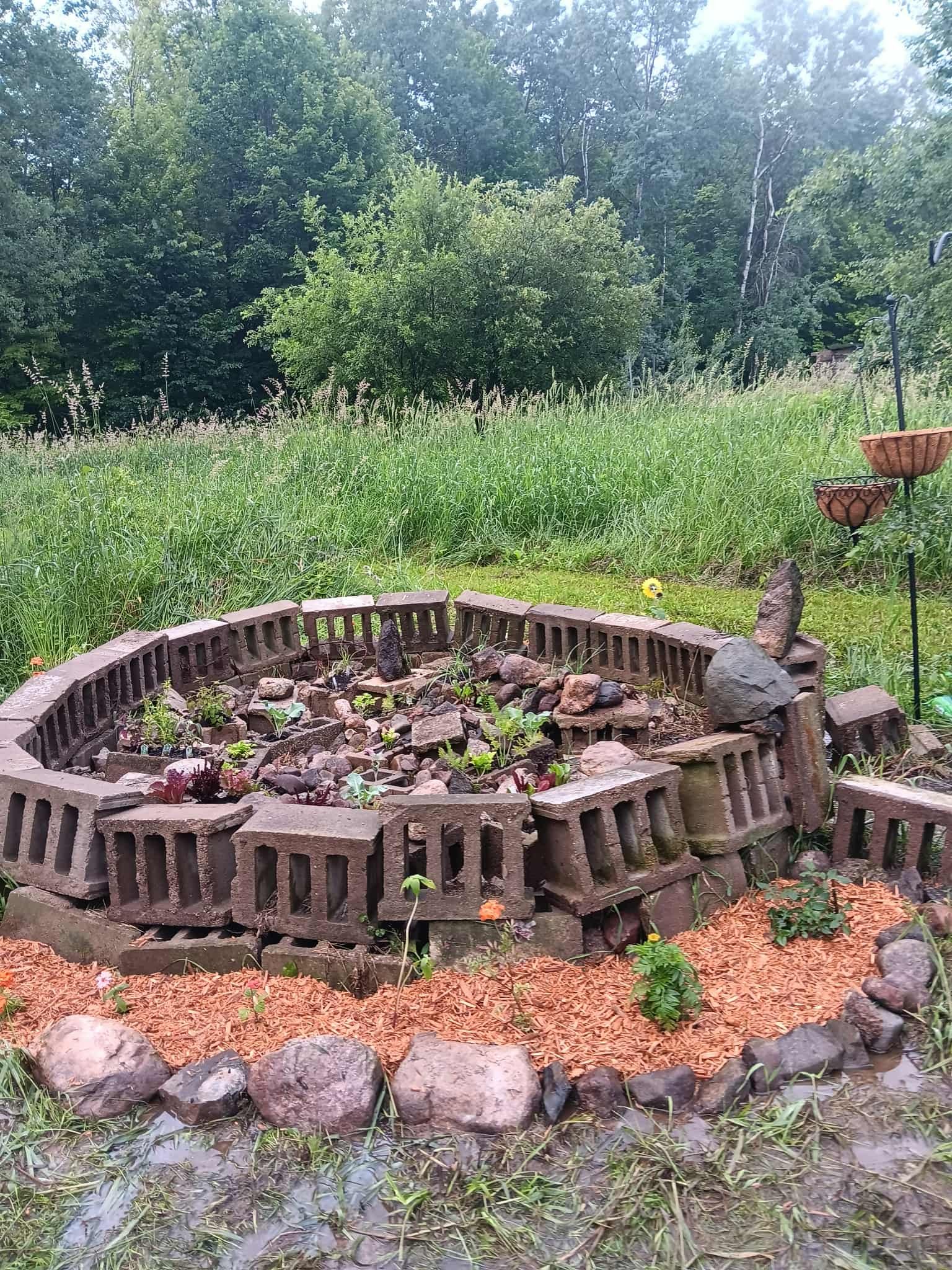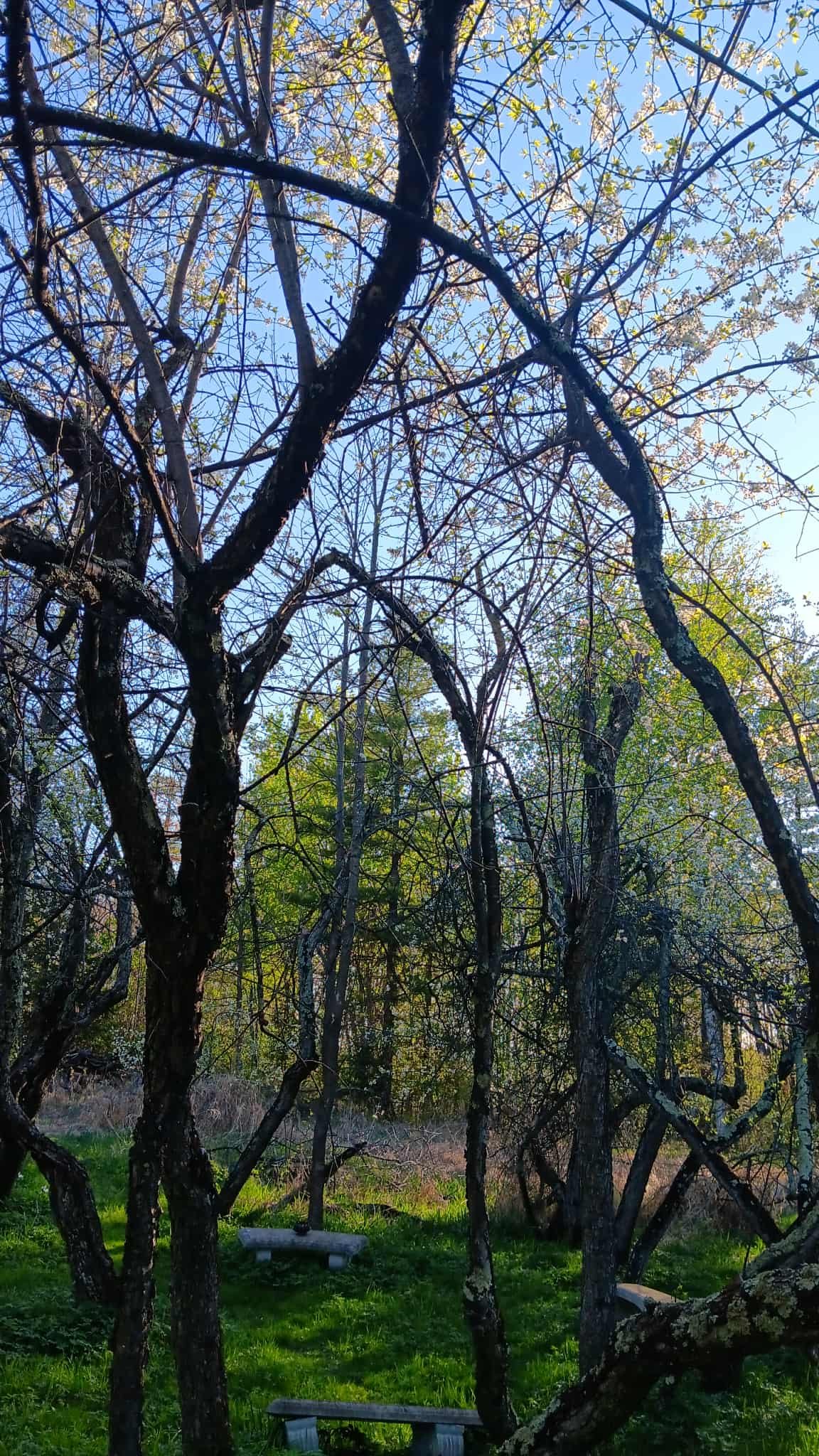Weaving a Greener Web: A Pagan's Guide to Earthly Stewardship
As I've grown, I've seen the effects of climate change transition from a distant threat to a present reality. I remember learning about global warming as a child, with warnings that our planet would suffer if we didn't act. Now, at 30, the consequences are undeniable: polar ice caps are melting, the Amazon is burning, and scientists predict our oceans could be empty by 2056. I am disheartened by the lack of proactive leadership in protecting our planet for future generations.
However, regardless of past actions, we have the power to choose a better path. While it's easy to feel that an individual's efforts are too small to matter, collective action is what truly creates change. The combined impact of many people making conscious choices can lead to a significant difference.
A photo I took of Frog Hall at Deeply Rooted Church. You can see there is solar panels on the side there which we are expanding. Being off grid and having a part in being responsible for 160 acres it is important to me not only as a Pagan but a animal living on this planet to take initiative to promote a healthy Earth.
So, What Can One Person Do?
For those of us who feel a deep, sacred connection to the Earth, this isn't just a political issue—it's a spiritual one. It's about honoring the planet that sustains us. While it's easy to feel powerless in the face of such enormous problems, the truth is, the most meaningful change begins with us. It isn't about grand gestures, but about the small, intentional acts of stewardship we can weave into our daily lives, in our homes, and our own backyards.
Our food choices are one of the most powerful tools we have to help the environment. By eating less meat, especially beef, you can significantly reduce your carbon footprint. The meat industry contributes to a huge percentage of global greenhouse gas emissions, and vast tracts of land are cleared for grazing and to grow feed, leading to deforestation and habitat loss. Consider a few meat-free meals a week, or try to source your food from local, sustainable farms.
When it comes to waste, remember that the three R's—reduce, reuse, and recycle—are just the beginning. The most important is to reduce what you buy in the first place. You can also get creative and reuse old items, turning glass jars into storage or old clothes into cleaning rags. When you do recycle, make sure your items are clean and sorted correctly to avoid contaminating the batch. Going a step further, you can start composting your food scraps, turning kitchen waste into nutrient-rich soil for your plants instead of sending it to a landfill.
Every purchase you make is a vote for the kind of world you want to live in. Avoid "fast fashion" and support companies with strong environmental ethics. By buying local, you reduce the carbon emissions associated with transportation and support your community. Before you throw something out, see if you can repair it. This not only saves you money but also keeps items out of landfills. Even your online habits have a footprint—unsubscribing from unnecessary email lists can help reduce the energy consumption of data centers.
Your yard, no matter how small, can be a vital part of a larger ecosystem. Plant native species that are accustomed to Wisconsin's climate. They are more resilient, require less water and maintenance, and provide essential food and shelter for local pollinators and other animals. You can also do your part by removing invasive plants, like garlic mustard or buckthorn, that choke out native species. In the fall, consider leaving a pile of brush or leaves in a corner of your yard, as they provide critical homes for overwintering insects and small animals.
Small shifts in your daily routine can make a big difference in conserving resources at home. Water wisely by taking shorter showers, turning off the water when brushing your teeth, and watering your plants in the early morning or evening. You can also save energy by switching to LED light bulbs, unplugging electronics when not in use, and using a programmable thermostat. Even simply hanging your clothes to dry instead of using a dryer can save a surprising amount of energy.
Our transportation choices also have a big impact. When possible, travel smart by walking, biking, or using public transportation. For longer trips, consider carpooling or choosing more fuel-efficient vehicles. Even combining all your errands into a single trip can make a significant difference in reducing your carbon emissions.
The Spiral Garden that was my larger project this year at Deeply Rooted Church. We are dipping our toes in the water and beginning to grow our own food. With more volunteers and planning we could expand on this. We also had a raised bed built, a table full of herbs and a giant pot of basil by the porch. Even a little home grown food is better than nothing and herbs grow very easily and well, some even returning as a perrenial.
Weaving a Deeper Web
There is always more we can do, especially when we start to think outside the box. It’s about more than just our personal habits; it's about being an active participant in our community and in a larger conversation.
You can use your financial power to support a greener world. If you have savings or investments, research companies and funds that align with your values. Choose to support businesses with strong environmental ethics and divest from those that harm the planet. This sends a clear message to the market that sustainability is a priority for consumers.
You can also lend a hand in your community. Look for local environmental groups or conservation efforts. You could volunteer for a local park cleanup, help plant trees, or assist with a native plant restoration project. This kind of work not only directly helps the environment but also strengthens your bond with the land you live on and connects you with like-minded people.
One of the most impactful things you can do is use your voice and your vote. Contact your local and state representatives to express your support for environmental legislation. Attend town hall meetings, sign petitions, and educate yourself on candidates' environmental platforms. Your vote is a powerful tool for change, and when enough people use it to prioritize the planet, our leaders will have to listen.
Finally, be a teacher and a learner. The best way to create a ripple effect is to share what you've learned. Talk to your friends and family about the small changes you’re making. Share articles on social media. But also, be open to learning from others. The environmental movement is constantly evolving, and by staying informed and open to new ideas, you can make an even greater impact.
A bullfrog floating in the pond of Deeply Rooted Church, surrounded by cat-tails and duckweed.
Taking It To The County Level
While individual actions at home are crucial, a more profound impact can be achieved by getting involved on a local level, within your own county. Here in Wisconsin, there are numerous opportunities to connect with the land and with others who are dedicated to its stewardship.
One of the most direct ways to help is to volunteer with local conservation groups. Organizations like the Wisconsin Department of Natural Resources (DNR) and The Nature Conservancy often have volunteer days dedicated to invasive species removal, native tree and plant restoration, and trail maintenance. This kind of hands-on work not only makes a tangible difference but also helps you learn about the local ecosystem and its specific challenges. You might find a local chapter dedicated to a nearby lake, river, or park that you can support.
Another powerful way to make a difference is to participate in citizen science projects. The Wisconsin DNR has programs that allow ordinary citizens to help collect data that scientists use to monitor the health of our environment. For example, through programs like "Snapshot Wisconsin," you can help track wildlife by monitoring a trail camera. There are also opportunities to participate in surveys for birds, frogs, and toads, providing valuable information on local biodiversity.
Beyond physical labor, you can also have an impact through your voice and your vote. Attend county board meetings and public forums to stay informed about local environmental policies and to voice your concerns. You can advocate for things like stricter zoning laws to protect wetlands, the creation of new public green spaces, or the adoption of sustainable farming practices. By engaging with your local representatives, you ensure that your values are part of the conversation when decisions are being made about the land you live on.
Finally, look for county-run programs that support environmental initiatives. Many counties in Wisconsin host annual native plant or tree sales, making it easy and affordable to get the right species for your yard. Some also offer "Clean Sweep" programs for the safe disposal of hazardous materials like old chemicals and pesticides, which keeps them from harming our water and soil. By taking advantage of these programs and encouraging others to do so, you can work together with your community to protect the land we share.
A peek at Sophia’s Grove at Deeply Rooted Church, a Pagan Sanctuary located in Athens, Wisconsin.
Pet Stewardship and the Environment
Fixing your pet and keeping cats indoors are practical acts of stewardship, mirroring the Pagan value of living in harmony with the natural world. Spaying or neutering your companion animal addresses the significant issue of pet overpopulation, which eases the burden on shelters and reduces the number of strays. Uncontrolled animal populations can impact local ecosystems by preying on native wildlife, causing traffic accidents, and spreading disease. By preventing unplanned litters, we not only ensure that every animal has a chance at a loving home but also honor the web of life, ensuring that the presence of domesticated animals doesn't disrupt the delicate balance of wild creatures and their habitats. This simple act of responsible care aligns with a deep reverence for all beings and the interconnectedness of existence.
Keeping cats indoors is another powerful way to practice environmental ethics. Free-roaming domestic cats are a major threat to native birds, small mammals, and other wildlife. As an introduced predator species, they can decimate local populations of animals that haven't evolved to defend themselves against such a prolific hunter. By providing a safe, enriched indoor environment, we are performing a sacred duty to protect both our beloved familiars and the wild creatures of our local land. This practice is a mindful choice, a conscious decision to nurture our pets while respecting the sanctity and integrity of the broader ecosystem.
A sleepy little Shen puppy.
A Guiding Light: Science-Based Resources
As a pagan and a lover of the Earth, I know that our magic and intentions are most powerful when they are grounded in truth. The same goes for our environmental work. I've found that my personal efforts feel more impactful when I understand the science behind them. For those of you who want to dig deeper into the facts, here are some incredible, science-based resources that I trust and often turn to.
I always recommend starting with The Intergovernmental Panel on Climate Change (IPCC). It's the gold standard for climate science, with reports that are a collaborative effort by thousands of scientists. While their full reports can be pretty dense, their summaries are clear and accessible. Another fantastic resource is NASA Climate. They provide easy-to-understand explanations of complex climate topics, all backed by data from their own research and satellites. It's a great place to find in-depth articles, visuals, and animations.
For hands-on inspiration, I often turn to The Nature Conservancy. They have a strong scientific team and publish a wealth of information on their projects, from restoring habitats to protecting vital ecosystems. Their website is full of compelling stories that show real-world conservation in action. Additionally, National Geographic's website is a trusted source for environmental news, with articles written by experts and known for their high-quality journalism.
Finally, for those of us living in Wisconsin, our most valuable resources are often the ones closest to home. I highly recommend checking out the Wisconsin Department of Natural Resources (DNR). They provide specific, local information on wildlife, habitat, land management, and citizen science programs you can participate in right here in our state.
Myself and a young red-tailed hawk, estimated to be around 2 years old. That my partner, Quill, and I found at the side of a highway and took to the Raptor Education Group Inc.






